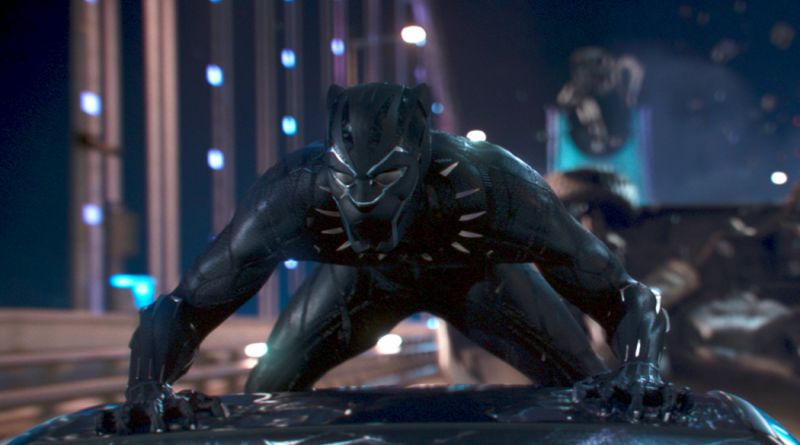Movie Review: “Black Panther” Offers A Radical Look At Oppression
![]() Brett Slaughenhaupt
Brett Slaughenhaupt
Movie Columnist & Social Media Director
With Ryan Coogler at the helm of Marvel’s first black superhero, he brings us a film for the ages, of the ages. After seventeen films over ten years in the current iteration of the Marvel Cinematic Universe, “Black Panther” is the first film to feel immediately specific to the culture around it and transcendent of the genre in which it is placed. This is not least of which due to the filmmaker’s decision to look through the lens of afrofuturism to guide the story.
Coined by cultural critic Mark Dery in the ‘90s, Afrofuturism is used to describe how Africans and African Americans could write themselves into futures of great advancement—through the arts, technology, business, etc. This term is intentionally aware of how colonialism and racism has impeded their abilities to flourish in current times.
Black artists can grant themselves agency to assert their own narratives to imagine the big “what if?” and to think of what great cultural advancement in art and technology would look like.
&’ async type=’text/javascript’>&’ async type=’text/javascript’>&’ async type=’text/javascript’>&’ async type=’text/javascript’>&’ async type=’text/javascript’>&’ async type=’text/javascript’>&’ async type=’text/javascript’>&’ async type=’text/javascript’>&’ async type=’text/javascript’>&’ async type=’text/javascript’>&’ async type=’text/javascript’>&’ async type=’text/javascript’>&’ async type=’text/javascript’>&’ async type=’text/javascript’>&’ async type=’text/javascript’>
In Other ✈ news…
>>PODCAST | Dayton Overlooked – Episode One: The Wright Sister
>>“39 Steps” Play Is Soon To Be Showing Here In Kettering, OH
The film follows T’Challa (Chadwick Boseman) after his father’s assassination. As is his duty, he must take on the role of “Black Panther” to protect his country of Wakanda, an advanced city hidden from the outside world. Believed to be a third-world country with very little to offer, we are soon told Wakanda is a flourishing major city which has seen great success in terms of technological advancement.
The structure of the Marvel world brings up a lot of interesting implications that come into play later in the film, like ‘what is the responsibility of those in power to those who are not?’
While we were given a tease for the world of Wakanda in “Captain America: Civil War,” the big reveal comes with a great sense of awe–not unlike walking into Oz for the first time. Production designer Hannah Beachler and costume designer Ruth E. Carter have put together a look for the film that is simultaneously out of this world and of it.

There is care put into giving the tribes of Wakanda distinct looks, which places them in a world of great advancement and creates a sense of authenticity often lacking from superhero films set in fantastical worlds. Seeing the Wakandan people wearing traditional garb coexist naturally with out-of-this-world technology gives the audience an image we don’t often see in film.
Like “Logan” of last year, “Black Panther” can craft a story adjacent to the Marvel universe, rather than directly inside of it. We aren’t being bombarded with cameo after cameo of superheroes, nor do we deal with the aftereffects of other films.
Instead Coogler and Joe Robert Cole have the chance to insert some breathing room into their introductions of the world and its people. This story works best because of its separation from the rest of the franchise and keeps the stakes grounded in the personal. It’s not accidental when this allows “Black Panther” to create one of the most interesting antagonists Marvel has seen.
&’ async type=’text/javascript’>&’ async type=’text/javascript’>&’ async type=’text/javascript’>&’ async type=’text/javascript’>&’ async type=’text/javascript’>&’ async type=’text/javascript’>&’ async type=’text/javascript’>&’ async type=’text/javascript’>&’ async type=’text/javascript’>&’ async type=’text/javascript’>&’ async type=’text/javascript’>&’ async type=’text/javascript’>&’ async type=’text/javascript’>&’ async type=’text/javascript’>&’ async type=’text/javascript’>
Played with a great sense of American swagger by Michael B. Jordan, Erik Killmonger stands in opposition to T’Challa, believing the successes of Wakanda should be shared with the world for the sake of all the oppressed. His anger stems from thinking about the plights of colonized Africans and black Americans who could have used their help in the past. In his mind, the Wakandans – and Black Panther, specifically – are complicit to past oppressions at the hands of Western nations and white people. For this reason, he wants revenge and plans to overthrow the throne to open up the borders and attack those who have attacked his people.
Although his tactics may be flawed, the rage in Killmonger’s eyes is valid. His arguments are hard to find fault in, making him an interesting foe to the more introspective T’Challa. This is not adversarial for the sake of adversaries, nor is it just a fight for power. What is being fought over is political and personal.

The film is endlessly enjoyable, with great performances across the board–yes, even Forest Whitaker finally utilizes an accent to some success.Not only is this a film with a black superhero, it’s a film with African culture and strong women at its center.
The story contains a multitude of nuance, which will allow it to remain relevant for years to come. No wonder this film has run away with nearly every box office record.
Photos Taken from screenrant.com, thegrio.com and ew.com.


